Reply To:
Name - Reply Comment
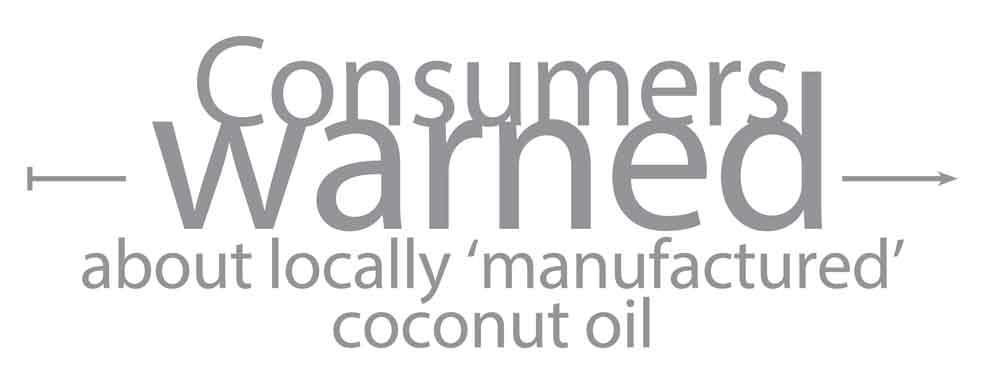
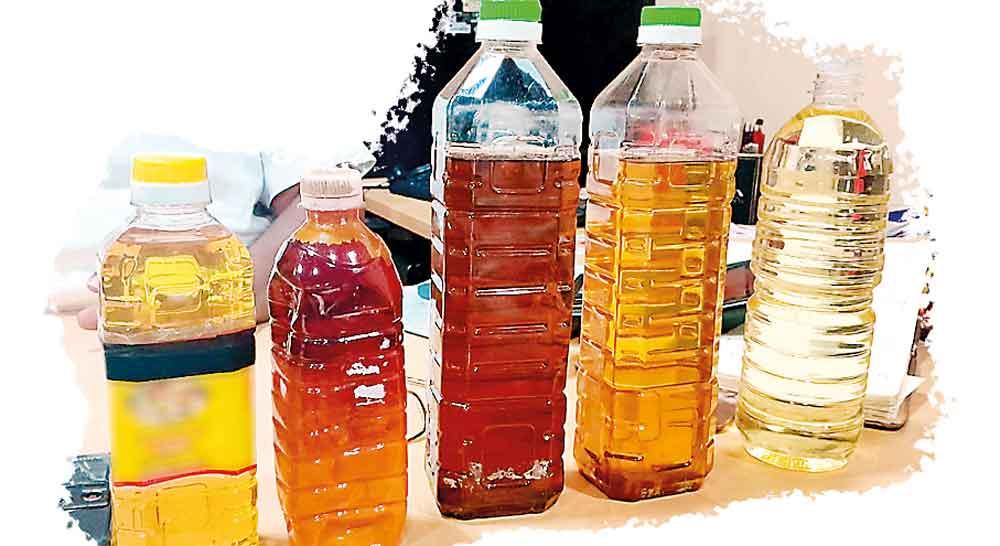
Imported synthetic ‘coconut oil’ which is later chemically refined and then made available in the market
|
Sri Lankan customs data clearly indicates that used coconut oil containing toxins has been imported into the country since 2020 Tax concessions have continued to be granted to those who import toxic coconut oil instead of developing the local coconut oil industry It is also alleged that consuming this coconut oil increases consumers’ exposure to carcinogens (A cancer causing substance) There are individuals controlling the country’s economy by undermining the local coconut oil industry and importing palm oil and toxic coconut oil Some importers claim that importing palm oil from Malaysia is more profitable than producing coconut oil in Sri Lanka |
 It has been revealed that 8,000 kilograms of artificially refined coconut oil, harmful to health, has been released into the market this year. Additionally, it has been disclosed that importers have spent $11,000 on this harmful coconut oil. Chemically refined, imported synthetic coconut oil has been exempted from VAT considering it as an essential food item. Imported coconut oil is also subject to the charge of the same VAT rate applied to domestically produced coconut oil. The VAR rate is 160 rupees per kilogram.
It has been revealed that 8,000 kilograms of artificially refined coconut oil, harmful to health, has been released into the market this year. Additionally, it has been disclosed that importers have spent $11,000 on this harmful coconut oil. Chemically refined, imported synthetic coconut oil has been exempted from VAT considering it as an essential food item. Imported coconut oil is also subject to the charge of the same VAT rate applied to domestically produced coconut oil. The VAR rate is 160 rupees per kilogram.
A large quantity of copra, unrefined used coconut oil containing toxic agents and palm oil has been imported into Sri Lanka, according to the inspection of import data. While palm oil imports were substantial before 2020, Sri Lankan customs data clearly indicates that used coconut oil containing toxins has been imported into the country since then.
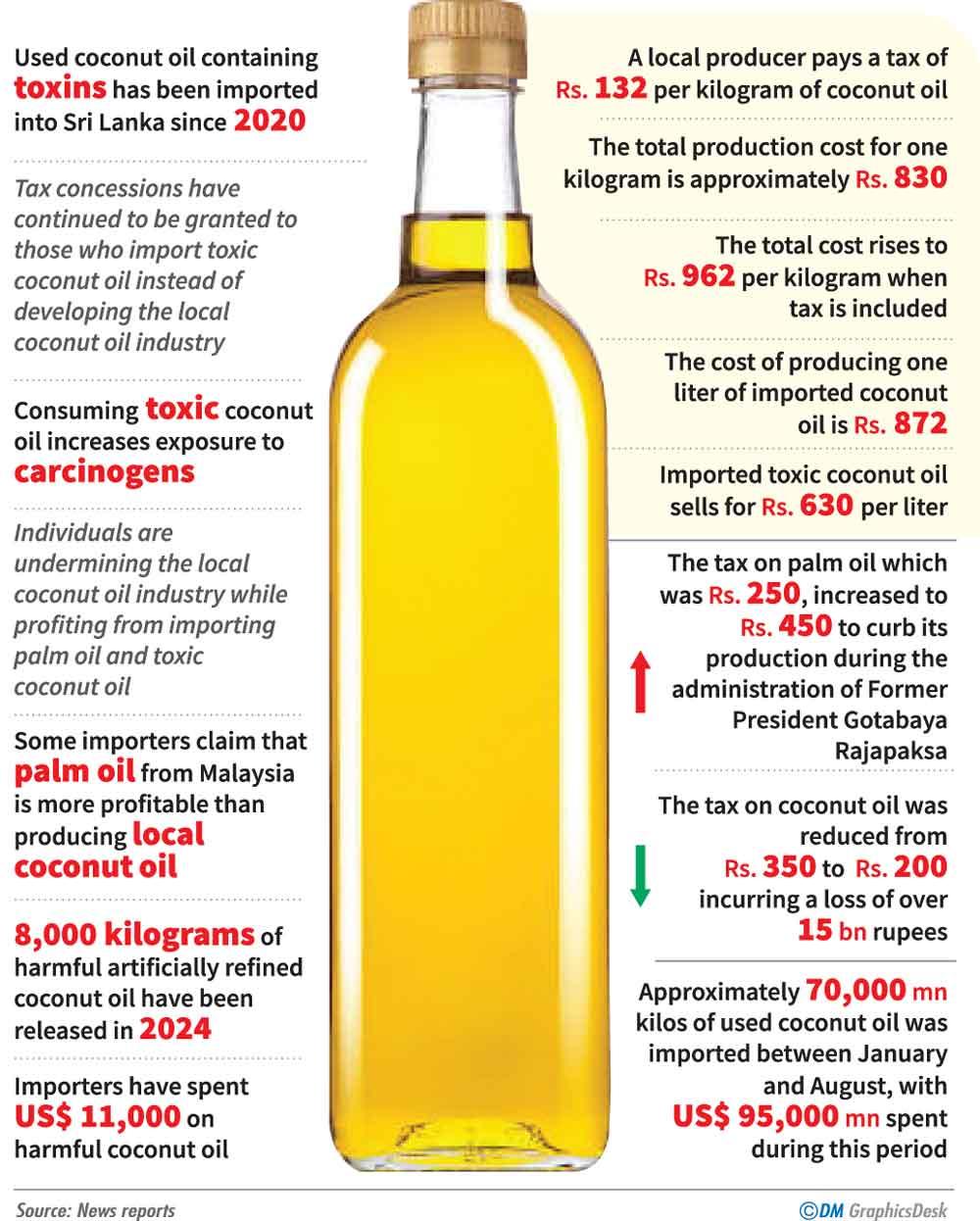
Instead of developing the local coconut oil industry and offering it concessions, tax concessions have continued to be granted to those who import toxic coconut oil. Those involved in the local coconut oil industry claimed that these practices have caused them great injustice. They argued that this is evident by the tax concessions given to importers of coconut oil, containing toxic substances, with claims being made that these products are ‘pure coconut oil’. As a result of allowing the import of harmful coconut oil, many serious issues have arisen. It is also alleged that consuming this coconut oil increases consumers’ exposure to carcinogens (A carcinogen is a substance, organism, or agent that can cause cancer).
Meanwhile, some importers make claims that importing palm oil from Malaysia is more profitable than producing coconut oil in Sri Lanka. With this mindset, campaigns were launched to promote palm oil over local coconut oil. Palm oil was refined and marketed as vegetable oil, and this trend commenced around the 1980s. During the early days of palm oil imports to Sri Lanka, there was a tax policy in place to protect the local coconut oil industry. The policy was specifically designed to safeguard local producers; with a tax of 350 rupees imposed by the government for this purpose. During the administration of Gotabaya Rajapaksa, the tax on palm oil, which was 250 rupees, was increased to 450 rupees to curb its production. Additionally, the tax on coconut oil was reduced from 350 rupees to 200 rupees.
Losses for the government
 As a result, the government incurred a loss of over 15 billion rupees from the coconut oil imported into Sri Lanka. This loss occurred when a ship carrying 15,000 metric tons of coconut oil remained anchored in international waters because taxes were reduced. By preventing the ship from entering the country and granting significant tax breaks, the government suffered financial losses similar to the sugar scam. Buddhika de Silva, Chief convener of the All Ceylon Traditional Coconut Oil Producers Association, noted that this situation caused the price of coconut oil to fall by 150 rupees per kilogram.
As a result, the government incurred a loss of over 15 billion rupees from the coconut oil imported into Sri Lanka. This loss occurred when a ship carrying 15,000 metric tons of coconut oil remained anchored in international waters because taxes were reduced. By preventing the ship from entering the country and granting significant tax breaks, the government suffered financial losses similar to the sugar scam. Buddhika de Silva, Chief convener of the All Ceylon Traditional Coconut Oil Producers Association, noted that this situation caused the price of coconut oil to fall by 150 rupees per kilogram.
“The companies that imported coconut oil, and caused a tax revenue loss of around 15 billion rupees, also own palm oil plantations. These companies benefited from the tax breaks, using the time to produce and sell palm oil from their crops. As a result, the cultivation of palm trees, which is still banned here in the island, remains intact for palm oil production,” said De Silva. He further said that these companies have maintained a monopoly on the market while continuing to produce palm oil.
There are individuals controlling the country’s economy by undermining the local coconut oil industry and importing palm oil and toxic coconut oil. They are actively disrupting domestic coconut oil production. If a local coconut oil producer manufactures one kilogram of coconut oil, they are required to pay a tax of 132 rupees. It costs about 830 rupees to produce one kilogram of coconut oil. When tax is added the total cost rises to 962 rupees. Even if profits from products like poonac cover some of the costs, it has become increasingly difficult to sustain the industry. The cost of producing one litre of imported coconut oil is 872 rupees.
In contrast, imported toxic coconut oil is sold in the market for just 630 rupees per litre. These are artificially refined oils. The coconut oil imported into the country is dark black and when artificially refined it takes various colours. De Silva added that there is no reliable method or process to verify the chemical changes that occur during the refining of coconut oil.
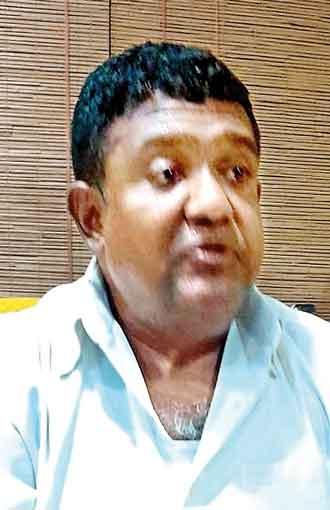
 The companies that imported coconut oil, and caused a tax revenue loss of around 15 billion rupees, also own palm oil plantations. These companies benefited from the tax breaks, using the time to produce and sell palm oil from their crops. As a result, the cultivation of coconut palms, which is still banned here in the island, remains intact for palm oil production
The companies that imported coconut oil, and caused a tax revenue loss of around 15 billion rupees, also own palm oil plantations. These companies benefited from the tax breaks, using the time to produce and sell palm oil from their crops. As a result, the cultivation of coconut palms, which is still banned here in the island, remains intact for palm oil production
- Buddhika de Silva, Chief Convener, All Ceylon Traditional Coconut Oil Producers Association
Additionally, there are no regulations governing this process. Some individuals driven by greed, exploit various methods to refine harmful coconut oil, which poses significant risks to human health. Unfortunately, there is no regulation in place to control these practices. Used coconut oil imported into Sri Lanka is first washed with sodium chloride, then heated to high temperatures to remove the sodium chloride. After that, chlorine is added to treat the oil. When this oil is imported, it is tested for the presence of aflatoxin. If aflatoxin is detected, it can be removed using the chemical HCI. However, there is no proper inspection of the chemical processes or other components involved in refining coconut oil. De Silva said that as a result an increasing number of people are suffering from non-communicable diseases such as high cholesterol, fatty liver and kidney-related conditions.
There is no ban on importing coconut oil into Sri Lanka. Under the Food Act, the import of unrefined coconut oil and refined, bleached, and deodorized (RBD) coconut oil is permitted. The imported coconut oil is tested and unrefined coconut oil checked for aflatoxin carcinogens. When importing RBD oil its FFA value, growth value, iodine value, and aflatoxin value are given top consideration. No type of coconut oil that violates these standards can be legally imported to Sri Lanka; such is the law.

 When unrefined and RBD oil is imported into Sri Lanka, every sample containing coconut oil is tested by food inspectors from the Food Control Administration Unit at Sri Lankan Customs. These samples undergo laboratory tests, and recommendations are made based on the results to determine whether the oil is fit for consumption. If the oil is deemed unsuitable, it is not allowed into the country
When unrefined and RBD oil is imported into Sri Lanka, every sample containing coconut oil is tested by food inspectors from the Food Control Administration Unit at Sri Lankan Customs. These samples undergo laboratory tests, and recommendations are made based on the results to determine whether the oil is fit for consumption. If the oil is deemed unsuitable, it is not allowed into the country
- Upul Rohana, Chairman Public Health Inspector’s Union
However, this rule is often disregarded and large quantities of oil-discarded after cooking in major commercial kitchens- are being refined and sold in the market. There is also a racket where this oil is sold in locations in Pettah where coconut oil is sold. Refined coconut oil is widely used in the local market at present. Used coconut oil from Malaysia and Singapore is imported, refined and then artificial flavouring agents are added to mimic the smell of fresh coconut oil. It is then sold in the market as ‘white coconut oil’. However, due to delays in the enforcement of the law, an investigation done by this newspaper revealed that coconut oil smuggling continues unchecked.
Approximately 70,000 million kilos of used coconut oil was imported between January and August, with 95,000 million dollars spent during this period. This coconut oil was refined and released to the market. Yet the authorities have not been able to properly inspect or disclose its quality to educate the public.
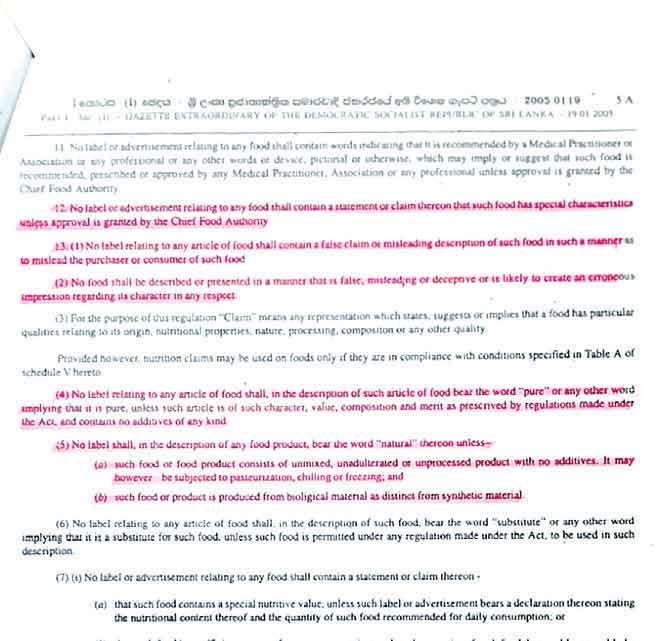
An extract from the 1971/6 Coconut Development Act which gives detailed guidelines about coconut oil production in Sri Lanka
According to Circular 9/2003, any product sold for consumption must display details that specify an expiry date, a date of manufacture, product certification and detailed information about the contents. However, the coconut oil available in the market doesn’t comply with these standards. And there is no law enforcing these requirements. This Circular states that refined coconut oil cannot be sold in the market. Yet, refined oil continues to be sold. Some of this oil is mixed with local coconut oil and treated with chemicals to enhance its scent before being marketed.
After the refining process, this coconut oil has no smell. However, after adding the necessary chemicals, it is made to have an appealing smell. Consumers are often led to believe that this oil is produced in Sri Lanka, but in reality, this coconut oil was not produced in the island and the only process carried out locally is the refining and adding of artificial flavours, according to De Silva.
Many companies import coconut oil in this manner, with some falsely claiming their products are made in Sri Lanka. In reality, some of these companies don’t even have coconut oil factories in the country. Even when they do, the production is not on a large scale. De Silva questioned why these companies would import unrefined coconut oil from abroad if they are producing coconut oil locally.and used coconut oil were imported, with a total expenditure of US$ 16,390,745. In 2024, 50,858,904 kilos of copra and used coconut oil were imported, costing US$ 29,760,559. It is clear that large quantities of unrefined coconut oil and coconut-related products have been brought into Sri Lanka under various HS codes, including H.15131119, H.15131990, H.15132100, H.151132900, H.15131111, H151311129, and H.15131121. This suggests that the imported unrefined coconut oil has been refined and reintroduced into the market.
Between 2011 and July 2024, significant quantities of unrefined coconut oil were imported under HS code 5.030101 from countries such as the USA, Canada, Germany, Australia, the United Kingdom, Turkey, China, and Japan. In 2023, under HS code 15131910, 79,262,671 kilos of copra
This newspaper spoke to Public Health Inspector’s Union Chairman Upul Rohana with regard to this issue and this was his response: “When unrefined and RBD oil is imported into Sri Lanka, every sample containing coconut oil is tested by food inspectors from the Food Control Administration Unit at Sri Lankan Customs. These samples undergo laboratory tests, and recommendations are made based on the results to determine whether the oil is fit for consumption. If the oil is deemed unsuitable, it is not allowed into the country. Additionally, random samples are tested by the Sri Lanka Standards Institution. Public health inspectors also monitor the market, enforcing orders according to the standards outlined in the Food Act No. 27 of 1980.
“According to the country’s import laws, unrefined coconut oil can be imported, treated properly and reused. As such, there should be no issue with the quality of coconut oil currently available in the market. If there are any problems, the oil will be tested and removed from the market,” he added.
This writer also attempted to inquire about this matter with the Sri Lanka Consumer Affairs Authority by calling their numbers (0117755455 and 1977), but those efforts proved futile. When this newspaper contacted the Sri Lanka Standards Institute, a spokesperson mentioned that a new chairman has not yet been appointed. However, they directed us to obtain relevant information through phone numbers 0112019639 and 0112019612. This writer called these numbers, but received no response. Therefore, both the Sri Lanka Standards Institute and the Consumer Affairs Authority have yet to provide a response on this issue.